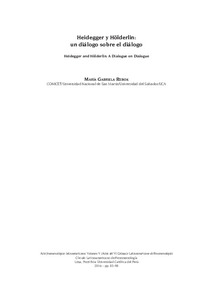Por favor, use este identificador para citar o enlazar este ítem:
https://repositorio.uca.edu.ar/handle/123456789/4958| Título: | Heidegger y Hölderlin : un diálogo sobre el diálogo Heidegger and Hölderlin : a dialogue on dialogue |
Autor: | Rebok, María Gabriela | Palabras clave: | Heidegger, Martin, 1889-1976; Hölderlin, Friedrich, 1770-1843; DIALOGO; FILOSOFIA | Fecha de publicación: | 2016 | Editorial: | Círculo Latinoamericano de Fenomenología Pontificia Universidad Católica del Perú |
Cita: | Rebok, M. G. Heidegger y Hölderlin : un diálogo sobre el diálogo [en línea]. En: V Acta fenomenológica latinoamericana, 2016. Disponible en: https://repositorio.uca.edu.ar/handle/123456789/4958 | Resumen: | "Desde Sócrates y Platón, la filosofía hizo múltiples aportes al diálogo, hasta desembocar en la famosa frase de Gadamer: “Un diálogo presupone que el otro podría tener razón” (Entrevista “Der Spiegel” 8/2000). Hablar, escuchar y ser escuchado, indica una copertenencia, un nos-otros, un ser-unos-con-otros. Implica un responder a una interpelación o llamado del ser (Seyn), al acontecimiento-propiación (Ereignis) en el caso de Heidegger y en el de Hölderlin responder a las señas (Winke) de los divinos. Es relacionarse consigo mismo por medio de Otro. Despliega el drama de la verdad como un descubrir lo que se sustrae y, al mismo tiempo, se dona. El propio lenguaje es por esencia dialogal, y procede del silencio y es fundamentalmente poesía (Dichtung), o sea, una institución (Stiftung) en el triple sentido de donación, fundación y comienzo. Perfilaremos el acontecimiento del diálogo en tres secciones: 1.- El posible diálogo entre el poetizar y el pensar 2.- El diálogo poético-pensante sobre el diálogo 3.-La repercusión del diálogo con Hölderlin en la “Kehre” heideggeriana" "Since Socrates and Plato philosophy has made many contributions to dialogue, culminating in Gadamer’s famous dictum: “A dialogue presupposes that the other may be right” (Interview in Der Spiegel, 8/2000). To speak, listen, and be heard implies a mutual belonging, a we, a being-with-others. It implies a response to an interpellation or a call from Being (Seyn), a response to the event of appropriation (Ereignis) in Heidegger’s case and a response to the signs (Winke) of the divine in Hölderlin’s case. It means to relate to oneself by means of an-other. It deploys the drama of truth as a discovery of that which retreats and, at the same time, is given. Language itself is dialogical, it emerges from silence and is fundamentally poetry (Dichtung), namely, an institution (Stiftung) in the triple sense of donation, foundation, and beginning. We will outline the event of dialogue in three sections: 1. the possible dialogue between poetry and thinking; 2. the poetic-thinking dialogue on dialogue; and 3. the repercussion of the dialogue with Hölderlin in Heidegger’s Kehre" |
URI: | https://repositorio.uca.edu.ar/handle/123456789/4958 | Disciplina: | FILOSOFIA | Derechos: | Acceso Abierto | Fuente: | Acta fenomenológica latinoamericana 5, 2016 |
| Aparece en las colecciones: | Artículos |
Ficheros en este ítem:
| Fichero | Descripción | Tamaño | Formato | |
|---|---|---|---|---|
| 83-98_Rebok_AFLV.pdf | 167,04 kB | Adobe PDF |  Visualizar/Abrir |
Visualizaciones de página(s)
362
comprobado en 30-abr-2024
Descarga(s)
206
comprobado en 30-abr-2024
Google ScholarTM
Ver en Google Scholar
Este ítem está sujeto a una Licencia Creative Commons

